- Clone
- MQ1-17H12 (See other available formats)
- Regulatory Status
- RUO
- Other Names
- Interleukin-2, T cell growth factor (TCGF), Eosinophil differentiation factor (EDF), Killer cell helper factor (KHF), Macrophage-activating factor for cytotoxicity I (MAF-C I), Thymocyte differentiation factor (TDF)
- Isotype
- Rat IgG2a, κ
- Ave. Rating
- Submit a Review
- Product Citations
- publications

-

PMA + ionomycin-stimulated (6 hours, in the presence of monesin) human peripheral blood mononuclear cells were surface stained with anti-human CD3 (clone UCHT1) FITC. Cells were then fixed, permeabilized, and intracellularly stained with anti-human IL-2 (clone MQ1-17H12) PerCP/Cyanine5.5 (left) or rat IgG2a, κ PerCP/Cyanine5.5 isotype control (right). Data shown was gated on the lymphocyte population.
| Cat # | Size | Price | Quantity Check Availability | Save | ||
|---|---|---|---|---|---|---|
| 500321 | 25 tests | 141€ | ||||
| 500322 | 100 tests | 306€ | ||||
IL-2 is a potent lymphoid cell growth factor which exerts its biological activity primarily on T cells, promoting proliferation and maturation. Additionally, IL-2 has been found to stimulate growth and differentiation of B cells, NK cells, LAK cells, monocytes, and oligodendrocytes.
Product DetailsProduct Details
- Verified Reactivity
- Human
- Reported Reactivity
- Cat, Chimpanzee, Baboon, Cynomolgus, Rhesus, Sooty Mangabey
- Antibody Type
- Monoclonal
- Host Species
- Rat
- Immunogen
- E. coli - expressed recombinant human IL-2
- Formulation
- Phosphate-buffered solution, pH 7.2, containing 0.09% sodium azide and BSA (origin USA)
- Preparation
- The antibody was purified by affinity chromatography, and conjugated with PerCP/Cyanine5.5 under optimal conditions.
- Concentration
- Lot-specific (to obtain lot-specific concentration and expiration, please enter the lot number in our Certificate of Analysis online tool.)
- Storage & Handling
- The IL-2 antibody solution should be stored undiluted between 2°C and 8°C, and protected from prolonged exposure to light. Do not freeze.
- Application
-
ICFC - Quality tested
- Recommended Usage
-
Each lot of this antibody is quality control tested by intracellular immunofluorescent staining with flow cytometric analysis. For flow cytometric staining, the suggested use of this reagent is 5 µl per million cells in 100 µl staining volume or 5 µl per 100 µl of whole blood.
* PerCP/Cyanine5.5 has a maximum absorption of 482 nm and a maximum emission of 690 nm. - Application Notes
-
ELISA or ELISPOT Capture2,3: The purified MQ1-17H12 antibody is useful as the capture antibody in a sandwich ELISA or ELISPOT assay, when used in conjunction with the Biotin anti-human IL-2 antibody (Cat. No. 517605) as the detecting antibody. The Ultra-LEAF™ purified antibody is suggested for ELISPOT capture. For ELISPOT capture applications, a concentration range of 4.0 - 8.0 µg/mL is recommended.
Additional reported applications (for the relevant formats) include: immunoprecipitation2, immunohistochemical staining of paraformaldehyde-fixed, saponin-treated frozen tissue sections1,4-6,8, neutralization13, and immunocytochemistry.
Note: For testing human IL-2 in serum or plasma, BioLegend's LEGEND MAX™ Kit (Cat. No. 431807) is specially developed and recommended.
Clone MQ1-17H12 cross-reacts to Cat15 -
Application References
(PubMed link indicates BioLegend citation) -
- Andersson J, et al. 1994. Immunology 83:16. (IHC)
- Abrams J, et al. 1992. Immunol. Rev. 127:5. (IP)
- Abrams JS. 1995. Curr. Prot. Immunol. Unit 6.20.
- Fernandez V, et al. 1994. Eur. J. Immunol. 24:1808. (IHC)
- Skansen-Saphir U, et al. 1994. Eur. J. Immunol. 24:916. (IHC)
- Andersson U, et al. Detection and Quantification of Gene Expression. New York:Springer-Verlag. (IHC)
- Prussin C, et al. 1995. J. Immunol. Methods. 188:117.
- Raqib R, et al. 2002. Infect. Immun. 70:3199. (IHC)
- Dzhagalov I, et al. 2007. J. Immunol. 178:2113. PubMed
- Colleton BA, et al. 2009. J Virol. 83:6288. PubMed
- Yoshino N, et al. 2000. Exp. Anim. (Tokyo) 49:97. (FC)
- Rout N, et al. 2010. PLoS One 5:e9787. (FC)
- Yeap SK, et al. 2013. BMC Complement Altern. Med. 13:145. (Neut)
- Wu Z, et al. 2015. J Virol. 89:6435. PubMed
- Maksaereekul S, et al. 2009. Vaccine. 28:3754 (FC) PubMed
- Product Citations
-
- RRID
-
AB_2123667 (BioLegend Cat. No. 500321)
AB_2123667 (BioLegend Cat. No. 500322)
Antigen Details
- Structure
- Cytokine; 15.4 kD (Mammalian)
- Bioactivity
- Proliferation of T lymphocytes, B cells, anti-inflammatory, hematopoiesis, tumor surveillance
- Cell Sources
- T cells
- Cell Targets
- T cells, B cells, NK cells, LAK cells, monocytes, macrophages, oligodendrocytes
- Receptors
- High affinity heterotrimer of IL-2Rα/β/γ, intermediate affinity homodimer IL-2Rα (CD25; p55; Tac) and heterodimer IL-2Rβ (CD122)/γ; γ-subunit (CD132) in common with IL-4R, IL-7R, IL-13R, IL-15R
- Cell Type
- Tregs
- Biology Area
- Cell Biology, Immunology, Neuroinflammation, Neuroscience
- Molecular Family
- Cytokines/Chemokines
- Antigen References
-
1. Fitzgerald K, et al. Eds. 2001. The Cytokine FactsBook. Academic Press, San Diego.
2. Taniguchi T, et al. 1993. Cell 73:5.
3. Nistico G. 1993. Prog. Neurobiol. 40:463.
4. Waldmann T, et al. 1993. Ann. NY Acad. Sci. 685:603. - Regulation
- Upregulated by NFAT; downregulated by TCF-8 and CIF (colostrums inhibitory factor)
- Gene ID
- 3558 View all products for this Gene ID
- UniProt
- View information about IL-2 on UniProt.org
Related FAQs
- How stable is PerCP/Cyanine5.5 tandem as compared to PerCP alone?
-
PerCP/Cyanine5.5 is quite photostable and also better than PerCP alone in withstanding fixation.
Other Formats
View All IL-2 Reagents Request Custom ConjugationCustomers Also Purchased
Compare Data Across All Formats
This data display is provided for general comparisons between formats.
Your actual data may vary due to variations in samples, target cells, instruments and their settings, staining conditions, and other factors.
If you need assistance with selecting the best format contact our expert technical support team.
-
APC anti-human IL-2
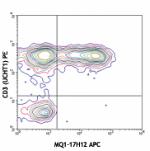
PMA + ionomycin-stimulated (6 hours) human peripheral blood ... -
FITC anti-human IL-2
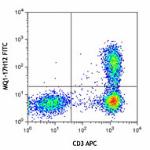
5 hours PMA + ionomycin-stimulated human peripheral blood ly... 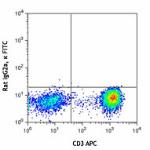
-
PE anti-human IL-2

PMA/Ionomycin-stimulated human PBMCs were stained with CD3 P... -
Purified anti-human IL-2
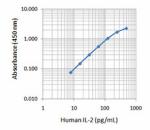
-
Alexa Fluor® 488 anti-human IL-2

PMA+ionomycin-stimulated (6 hours) human peripheral blood ly... -
Alexa Fluor® 647 anti-human IL-2
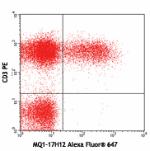
PMA+ionomycin-stimulated (5 hours) human PBMCs surface stain... -
Alexa Fluor® 700 anti-human IL-2
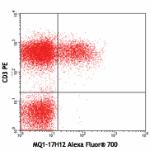
PMA+ionomycin-stimulated (5 hours) human PBMCs surface stain... -
PerCP/Cyanine5.5 anti-human IL-2

PMA + ionomycin-stimulated (6 hours, in the presence of mone... -
Pacific Blue™ anti-human IL-2
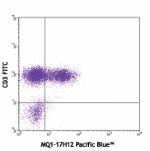
PMA+ionomycin-stimulated (5 hours) human PBMCs surface stain... 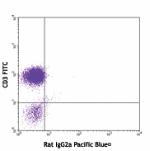
PMA+ionomycin-stimulated (5 hours) human PBMCs surface stain... -
PE/Cyanine7 anti-human IL-2

PMA + ionomycin-stimulated (6 hours, in the presence of mone... -
Brilliant Violet 421™ anti-human IL-2
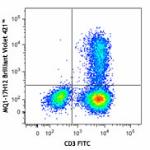
Human peripheral blood lymphocytes were stimulated with PMA ... 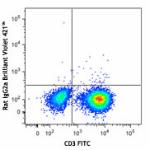
-
Brilliant Violet 605™ anti-human IL-2
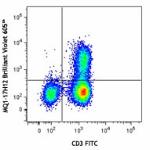
Human peripheral blood lymphocytes were stimulated with PMA ... -
Brilliant Violet 650™ anti-human IL-2
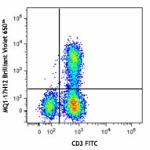
PMA+ionomycin-stimulated human peripheral blood lymphocytes ... 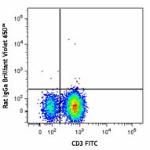
-
Brilliant Violet 510™ anti-human IL-2
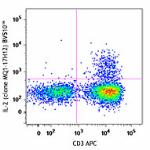
PMA + Ionomycin-stimulated (6 hours) human peripheral blood ... 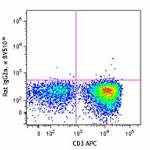
-
Brilliant Violet 711™ anti-human IL-2
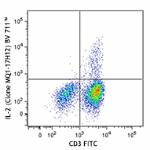
PMA + ionomycin-stimulated (6 hours) human peripheral blood ... 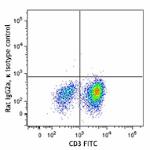
-
APC/Cyanine7 anti-human IL-2

Human peripheral blood lymphocytes were stimulated with PMA ... -
Purified anti-human IL-2 (Maxpar® Ready)
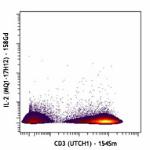
Human PBMCs were incubated for 5 hours in media alone (top) ... 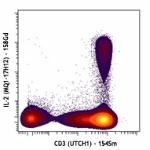
-
PE/Dazzle™ 594 anti-human IL-2
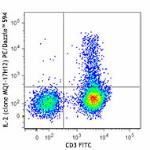
PMA + ionomycin-stimulated (6 hours) human peripheral blood ... 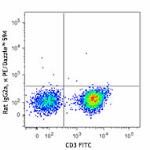
-
Brilliant Violet 785™ anti-human IL-2
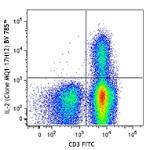
Human peripheral blood lymphocytes were stimulated with PMA ... 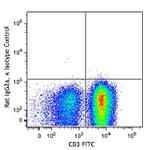
-
PerCP anti-human IL-2
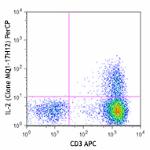
PMA + ionomycin stimulated (6 hours) human peripheral blood ... 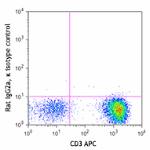
-
APC/Fire™ 750 anti-human IL-2

PMA + ionomycin stimulated (6 hours) human peripheral blood ... -
Ultra-LEAF™ Purified anti-human IL-2

-
APC/Fire™ 810 anti-human IL-2

PMA + ionomycin stimulated (6 hours) human peripheral blood ... -
TotalSeq™-B1005 anti-human IL-2
-
Brilliant Violet 750™ anti-human IL-2

PMA+ ionomycin stimulated (6 hours) human peripheral blood l... -
Spark UV™ 387 anti-human IL-2

Human peripheral blood lymphocytes were stimulated with Cell... -
TotalSeq™-C1005 anti-human IL-2

 Login / Register
Login / Register 












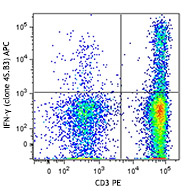
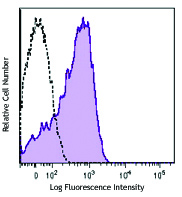
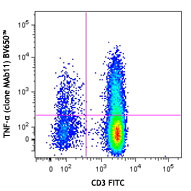



Follow Us